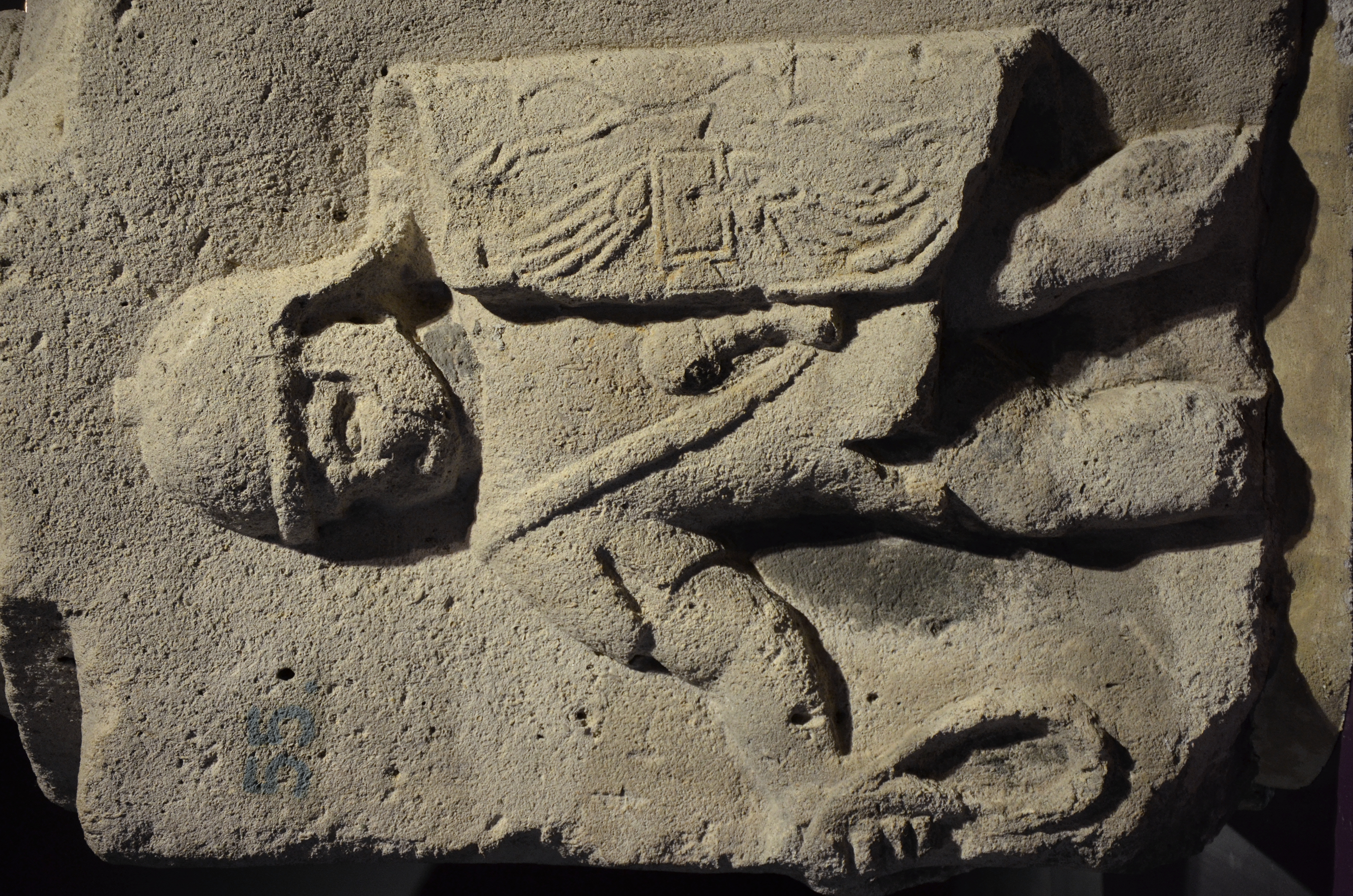Blog
M. W. Bassford
How We Should Walk
Thursday, January 13, 2022
All of us know Christians who have fallen away. Even though they committed their lives to Christ, they broke the covenant that they had made and now are living the doomed life of the people of the world. Usually, they didn’t make this change all at once. Instead, the devil used subtle temptations to lure them away from the Lord bit by bit.
These tragic stories are more than just a source of grief to us. They also are a warning. None of those Christians who have fallen from grace obeyed the gospel intending to abandon Jesus. They all thought they were going to stay faithful and inherit eternal life—just like we do. However, the devil enticed them away, and he would love nothing more than to do the same to us.
It’s vital, then, for each of us to hold the line against worldliness. All of us are constantly tempted, and without constant determination and vigilance, Satan will get us where he wants us. The grace of Christ will do us no good if we turn our backs on it. With this in mind, let’s examine a text from Ephesians that tells us how we should walk.
The first portion of this context instructs us in PRESERVING OUR INHERITANCE. Let’s read from Ephesians 5:3-7. Paul warns us about two classes of spiritual problems here. The first is a familiar list of sins: sexual immorality, impurity, and greed. The second is speaking crudely about or joking about sexual immorality and impurity.
I understand the latter temptation all too well. I love words, and I love joking. I know that if I were not a Christian, I would have a potty mouth and make lots of dirty jokes. However, we must recognize the great spiritual danger that comes with so doing. Once we start talking about sex and sexual sin in careless, ungodly ways, we open the door to careless sexual sin. What is on our lips is in our hearts and soon will be in our lives.
This could not be more consequential. Paul tells us plainly that if we give in to the sins he discusses, we will lose our inheritance in the kingdom of God. We must remember how deceitful the devil is here. On the one hand, he is working as hard as he can to get us to spend eternity in hell. On the other hand, he constantly is whispering in our ears that it’s never going to happen to us.
If he can keep us fooled until our lives end, he’s got us. Sadly, there are going to be lots of surprises on the day of judgment, and none of them will be good. There are going to be countless millions of people who believed Satan when he told them that their sins weren’t a big deal, and they will find out too late just how strongly God disagrees. We must not let that happen to us!
As part of our vigilance, we must beware of the empty, deceitful arguments that the world around us makes. The worldly redefine sin as love and then ask how love can be wrong. They suggest that shacking up is a great way to prepare for marriage. They tell us that more money and more stuff will make us happy. All of those and many others are lies, and if we believe them, they will cost us more than we can afford.
Additionally, Paul tells us that we must live AS CHILDREN OF LIGHT. Let’s keep going with Ephesians 5:8-14. The first thing that Paul tells us is that this involves a walk. Here, as elsewhere in Scripture, we are confronted with the difference between walking in the light and walking in darkness.
This isn’t about any one action or any one choice. It’s about the total of all the choices we make. Either we are walking with Christ and sharing in the benefits of His grace, or we aren’t. We’re not supposed to see how close to that line we can get. We’re supposed to do our best to make sure we aren’t anywhere near it.
If we are walking in the light, it will produce fruit in our lives, fruit like goodness, righteousness, and truth. As is true throughout this lesson, this passage calls us to relentless self-honesty. Everybody wants to believe that their lives bear this kind of fruit. Do ours really? Or, instead, do we justify our apathy and sin by pointing to the few exceptions?
One of the best tells here is our willingness to expose the unfruitful works of darkness. This doesn’t mean pointing to the enemies of the gospel and decrying their sin. It means exposing sin among our own.
Sad to say, Christians have had a hard time with this since the days of Ananias and Sapphira. Maybe the sinner is a family member, so we turn a blind eye to their misdeeds. Maybe the sinner is a church leader, a preacher or elder engaged in sexual sin, so we try to deal with the sin quietly or maybe even ignore the accusation altogether.
In all these instances, Satan is trying to use fear of the consequences to manipulate us. We worry what will happen to our families, our churches, or even to us if the truth comes out. Brethren, God is not pleased with those who condone sin out of fear. Whatever we fear the consequences of telling the truth will be, the consequences of hiding the truth will be even worse.
Finally, our walk should involve MAKING THE MOST OF THE TIME. Our reading concludes with Ephesians 5:15-17. Notice that this reading begins with another appearance of a theme from the context: the importance of walking carefully instead of carelessly. People who walk carelessly don’t pay attention to what they’re doing or where they’re headed; people who walk carefully pay a great deal of attention to both. The latter is obviously harder, but we must remember that nobody goes to heaven by accident.
Second, Paul urges us to make the most of our time. If I remember correctly, the first sermon I ever preached in the Dowlen Rd. preacher-training program was about this verse, so I’ve been familiar with it for a long time. However, I will say that since my diagnosis, it has taken on a whole new importance. I know that my time is limited, so I want to use the time I have left as effectively as I can for the Lord and the people I love.
Really, though, isn’t that the way that every Christian should be living all the time? We all have limited time, even though we usually don’t know how limited. God and others are most important in all of our lives, even if circumstances haven’t brought that fact to our attention yet. If we live with those priorities and that sense of urgency, we never will regret it. The times we will regret are the times we don’t.
Last, Paul tells us that wisdom entails not only walking carefully but also understanding the Lord’s will. No matter how carefully we drive, unless we have a road map that tells us where we’re going, we’re going to get lost. In this case, God isn’t going to drop the road map into our minds for us. We have to seek that map for ourselves through study and prayer if we want to understand His will.
To Live Is Christ; to Die Is Gain
Tuesday, January 11, 2022
Among its other effects, a terminal diagnosis will lead you to read the Scriptures with very different eyes. All sorts of passages that you thought you understood take on new depth and meaning. For me, the chief of these is Philippians 1:21-24.
Years ago, I read this passage as Paul being Paul. He was a good man and loved the Philippians, so he wanted to continue living in order to help them. That’s true, but it’s vastly incomplete because it doesn’t really reckon with either half of Philippians 1:21.
Let’s start with the back half. When Paul describes death as gain, he isn’t guessing. According to 2 Corinthians 12:2-4, he was caught up into the third heaven and heard inexpressible things that no human can repeat. The unimaginable joys of eternal life were no mystery to him.
Against that gain, though, he balances life in the likeness of Christ. Serving the Philippians is as precious to him as his heavenly reward. This might seem incredible to us, but I think it’s where most genuine disciples would end up if they were placed in Paul’s position.
I’m not eager to die. I don’t look forward to the process of dying, which is likely to be very unpleasant. I don’t relish giving up my abilities one by one. I already miss hunting and hiking, and I’m sure I’ll miss being able to walk when I lose that. However, against those things, I can set my hope of that which is far better. From a selfish perspective, heaven wins every time!
Instead, the losses that I mourn the most are of my opportunities to serve others. I bitterly regret that I probably won’t be able to finish raising my children. I grieve that I won’t be able to give my wife a lifetime of being happily married. I mourn that I will have to step away from the pulpit and the keyboard and won’t be able to help others on to heaven. Once I die, I will be done with all of those things.
I think that’s what Paul is talking about when he says, “To live is Christ.” Christ was a servant who actually LEFT HEAVEN so He could come to earth and help us! The essence of following Him is living with self-sacrificing love. Paul prized the opportunity to do that so highly—an opportunity that would last only as long as his life did--that he was willing to postpone his reward for the sake of others.
The Christian’s bucket list, then, doesn’t consist of travel and skydiving. There’s nothing wrong with them, of course, but they are of no lasting value. Instead, the truly valuable things in life are the times when we can put a family member or a friend ahead of ourselves, take on that Bible class at church that nobody else wants to teach, or gather our courage and invite an outsider to worship with us. Those, not our possessions or abilities, are our true gifts. As Paul found, they are the only things in this life that are worthy to be compared to the joys of heaven.
The Terrifying Resurrection
Thursday, January 06, 2022
Every Christian should be able to affirm along with Paul the words of Acts 24:15. There, he says, “I have a hope in God. . . that there will be a resurrection, both of the righteous and the unrighteous.” This hope is an inexpressible comfort to me in my illness, and it is the bedrock of our faith. However, the promise that we find so hopeful and comforting may be very much the opposite to others.
This is evident even in the context of Paul’s statement. His audience is Felix, the corrupt Roman governor of Judea. Even after the judicial hearing of Acts 24:1-23 is over, Felix invites Paul back so he can hear more about faith in Christ.
However, once Paul begins to speak, the tables are turned. It is not the prisoner of Christ who comes away from the discussion intimidated and fearful. It is the powerful government official. As Acts 24:25 reports, when Paul spoke on righteousness, self-control, and the judgment to come, Felix became so frightened that he couldn’t bear to hear anymore and sent Paul away.
This reveals that just as Paul had a hope of resurrection, Felix had a hope of not-resurrection. He was cruel and greedy. He used his position to solicit bribes--Paul’s experience here was a common one.
What’s more, in this life, no one could challenge Felix on any of it. He was the brother of the powerful imperial secretary Pallas. When Felix returned to Rome at the end of his term of office, his brother used his influence to shield him from prosecution for his crimes. Felix went to his grave unpunished.
How terrifying it must have been for such a man, a man who knew that he never would be called to account in this life, to learn that he would be called to account after it was over! Judgment could not be averted after all. Felix knew that he was neither righteous nor self-controlled, so he could have little doubt about what the outcome of the judgment would be.
Felix had two choices. He could become a Christian, give up his wicked ways, and invite contempt from everyone who knew him. Alternatively, he could determine that Paul was wrong and there would be no resurrection after all.
If there were no resurrection, Felix would be safe. No one ever would hale him into court. The scales of justice never would be balanced. His wickedness would have no more consequences than another man’s righteousness. Our fear—that our faith is vain—was Felix’s hope.
One of my favorite things about Christianity is that Christ makes life meaningful. If I am loyal to Him, I will receive an eternal reward. However, Christ doesn’t make life meaningful only for Christians. He makes it meaningful for everyone.
Because of the resurrection, eternal life is on the table for all of us, but so too is eternal torment. Our choices in life determine which we will get. Thus, for the righteous, the gospel is the best news imaginable. For the unrighteous, it is the worst.
God's Whole Armor
Wednesday, January 05, 2022
Ephesians 6:13-17 is perhaps the most familiar passage in the entire epistle. Most Christians have heard at least one sermon about the whole armor of God, complete with a helpfully labeled illustration of a Roman soldier. Certainly, there is much to be gained from considering the importance of salvation, righteousness, and so forth to our spiritual lives!
However, there’s another point in this well-known text that is worth considering, and it comes from the phrase that usually only supplies the title for the sermon. We read, “the whole armor of God,” and we think, “OK; this is the armor that God gives us.” That’s true, but it’s incomplete. The whole armor of God isn’t only the armor that God gives. It’s also the armor that He wears.
This is evident from Paul’s use of the Old Testament. He didn’t invent any of the items of the Christian’s armament. Instead, he took passages describing the armament of God and cited or adapted them.
This is most obvious when it comes to the helmet of salvation and the breastplate of righteousness. Both come from Isaiah 59:17, in which Isaiah says of God, “He put on righteousness like a breastplate, and a helmet of salvation on His head. . .” (NASB95, and throughout). Paul clearly adapted that language for his own purposes, and the adaptation gives us the key to his whole approach.
Similarly, we find the shield of faith in the last part of Psalm 91:4, which tells us, “His faithfulness is a shield and bulwark.” The same Greek word is translated in our Bibles as both “faithfulness” and “faith”.
The other items in the panoply are a bit trickier. The sword that is the word of God is taken from Hosea 6:5, where God says of His unfaithful people, “Therefore I have hewn them in pieces by the prophets; I have slain them by the words of My mouth. . .” The passage doesn’t say straight up that God’s word is a sword; it merely describes His words as a hewing, slaying implement. However, from “hewing, slaying implement” to “sword” isn’t much of a leap.
The belt of truth also takes a little bit of digging to figure out. In the Old Testament, it appears in the Messianic prophecy of Isaiah 11:5, which reads, “Also righteousness will be the belt about His loins, and faithfulness the belt about His waist.” The link becomes clearer when we realize that the Hebrew word for “faithfulness” also can be translated “truth” and is so translated in the Septuagint, which Paul used in his writing.
Finally, we come to the preparation of the gospel of peace. This comes from Isaiah 52:7, which says in part, “How lovely on the mountains are the feet of him who brings good news, who announces peace. . .” If we look only at the verse, the antecedent of “him” is unclear, but the previous verse, Isaiah 52:6, is about God speaking. In Isaiah 52:7, “him” probably should be “Him”.
Paul, then, isn’t merely telling us to use the equipment that God offers us. He’s telling us to fight like He does, with all of His weapons and His virtues. If that’s the way we enter into spiritual warfare, the devil scarcely can hope to defeat us.
Having the Mind of Christ
Thursday, December 30, 2021
If you were to listen to modern Christmas radio these days and didn’t know anything about the history of the holiday, you would be justified in concluding that it is primarily a romantic event. There are innumerable songs on the theme of “all I want for Christmas is you”, more about how awful it is that the singer’s jerk significant other dumped them for the holidays, still more about being lonely during Christmas, and so forth.
Interestingly, this represents not only a departure from discussing the birth of Jesus as traditional carols once did but also a departure from the spirit of Christ. Like most modern songs, these modern Christmas songs are self-centered, which Jesus was not. Selfishness and godliness are opposites. To the extent that one exists in a human heart, the other cannot.
We, of course, do not honor Christ only during this season, nor do we seek to imitate Him only during the holidays. All day, every day, He is both our Lord and our example. This morning, then, let’s consider what we can learn from Paul’s discussion of Jesus’ birth about having the mind of Christ.
In pursuit of this goal, we’re going to take a familiar text and rearrange it a little bit. First, we’re going to consider WHAT CHRIST DID. Let’s read from Philippians 2:5-7. I believe that this is the single longest discussion of the birth of Christ in any of the epistles, and the perspective it takes on that event is revealing.
If somebody asked us what the meaning of Christ’s birth is, we might talk about the joy and wonder of God becoming flesh. We might discuss the way that he fulfilled the prophecies concerning His birth—born of a virgin, born in Bethlehem, and so on. However, Paul doesn’t go in any of those directions. Instead, he says that the spiritual essence of Christ’s birth is His humility.
We see this humility most spectacularly displayed in v. 6. I think that many of our translations here are opaque. They translate the words of the Greek without giving us much insight into its meaning. We struggle to figure out, for instance, what it means when our Bible says that He did not regard equality with God as a thing to be grasped. In English, is equality a thing? Can we grasp it?
I think that some of the freer translations can help us out here. The NLT says that Christ didn’t think of equality with God as something to cling to. The NIV tells us that He didn’t consider it something to be used to His own advantage. My favorite, the CSB, reports that he didn’t consider it something to be exploited.
Taken together, they give us a new and challenging insight into the nature of humility. We think of the humble person as one who does not thrust himself forward and demand credit for his achievements. That’s not what Christ did, though. Instead, He was in a position of immense privilege, but He didn’t use that privilege for His own advantage.
Today, the people of our country love to talk about their rights. Indeed, the Constitution grants us many rights, but as we contemplate those rights, we also must remember that we serve One who had the right to equality with God in heaven and gave it up. If we follow Him, we often will find ourselves turning our backs on the rights that we have in order to better serve others.
Next, let’s consider Paul’s thoughts on BEING LIKE CHRIST. Look at Philippians 2:1-2. Notice first of all that Paul is pulling out the heavy artillery in his efforts to get the Philippians to live in harmony. He lists several of the greatest blessings we have as Christians then says that if we have enjoyed any of these things, we should seek like-mindedness with each other.
This too is an attempt to jar us out of the self-seeking mindset of the world. Even as Christians, we like getting the good stuff from others, but we struggle with dishing it back out. We love it when others encourage us, but it’s easy for us to go through life in our self-centered little bubble and never think to encourage others. We’re so appreciative when others show us affection and compassion in our failure and sin, but when somebody lets us down, too often our first instinct is to throw the book at them! Brethren, the only right measure of the grace we show others is the grace we want to receive. I need mercy from God and others so often, and when I am tempted to be unmerciful, that is the very thing I must remember.
Next, Paul urges us to a level of unity that seems impossible. We live in a deeply divided country, in the midst of a deeply divisive pandemic. We are separated by differences of race and gender. We have different backgrounds and different life experiences. For that matter, we study the same passage or Scriptural topic and reach different conclusions.
In the face of that, Paul tells us that we must be of the same mind, maintain the same love, be united in spirit, and seek the same goal. Surely he’s living in la-la land if he wants us to do all that, amirite?
Before we get too dismissive, though, we ought to remember that the divisions in the first-century church were, if anything, even worse. Consider, for instance, the devout Jew who becomes a Christian and, next Sunday morning, finds himself rubbing shoulders with a Gentile who is a former homosexual prostitute. There was no rehabilitation for guys like that under the Torah; instead, they were stoned to death. Do you think that such people found it easy to be of the same mind?
In fact, the answer for us is the same as it was for them: we learn to see one another through the eyes of Christ. We don’t always agree about everything, but our attitude toward one another never changes. We press on together toward the goal, and we show the world by our love for one another that we are His disciples.
Finally, Paul points us toward ACTING LIKE CHRIST. Consider Philippians 2:3-4. The first part of this, though it is very difficult, at least is plain. Christ never did anything selfish. We shouldn’t either. Christ never acted out of vain conceit. Neither should we.
Instead, the attitude that our actions should shout is humility. Everybody who looks at our behavior should be able to tell whom we think is most important, and that person should never be us. That’s what a Christian looks like, and if this verse doesn’t make us feel about six inches tall, we probably don’t understand it.
Last, we learn that we are supposed to look out for the interests of others as well as our own. This seems like a relief from all the toe-stepping in the previous verse, but it isn’t. There are few things in this life that are harder than loving others and being deeply invested in their welfare.
It means that you’ve got a lot of people on your heart, all the time. It means that you spend sleepless nights worrying and praying about them. It means that when they sin, you feel worse about it than they do. We might ask why on earth anyone would take up a burden like that. The answer is simple: because Jesus did.


